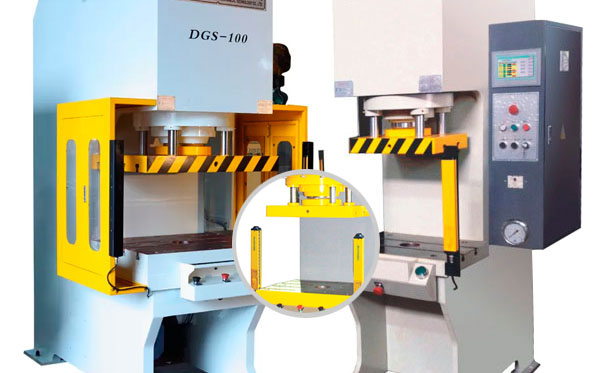Single Column Hydraulic Press: Balancing and Stabilizing DeviceUpdate:2024-12-16 Hits:130
Goodsjack/Delishi single column hydraulic press adopts an intelligent structure, C-type single arm, and has features such as good reliability, simple structure, and easy operation. With a rigid turn-key clutch, the press has single or continuous operation standards.

Following are the mainly balancing and stabilizing devices of single-column hydraulic presses.
Combination mechanism of guide vertical rod and transmission horizontal axis rod
Structural design: It is composed of several parallel and symmetrical guide vertical rods and transmission horizontal axis rods. The guide vertical rod part of the rod body penetrates and is fixed in the vertical channel holes set inside the four corners of the upper beam body, and the bottom end of the remaining rod body part extending outside the vertical channel hole is fixed to the slider; the transmission horizontal axis rod is fixed to the upper beam body and is connected to each guide vertical rod.
Working principle: When the slider moves up and down, the guide vertical rod plays a role in limiting the shaking of the slider and ensuring the accuracy of its movement direction; the transmission horizontal axis rod is connected to the guide vertical rod through the transmission connection with the guide vertical rod, so that each guide vertical rod works together, further enhancing the balance and guiding effect of the slider, reducing the large shaking of the slider during operation, thereby ensuring the smooth operation of the hydraulic press.
Guide column and guide sleeve matching mechanism
Structural design: It includes two parts: the guide column and the guide sleeve. The guide post is usually installed on the body or fixed parts of the hydraulic press, and the guide sleeve is installed on the slider or movable part. There is a clearance fit between the guide post and the guide sleeve. The surface of the guide post is generally quenched, ground, etc. to improve its hardness and surface finish and reduce friction and wear.
Working principle: During the operation of the hydraulic press, the slider moves up and down under the guidance of the guide post, and the guide sleeve slides along the surface of the guide post. The precise fit between the guide post and the guide sleeve provides stable support and guidance for the slider, preventing the slider from offsetting or tilting during movement, thereby ensuring the balance stability of the hydraulic press.
Balance circuit system
Structural design: It is mainly composed of hydraulic components such as one-way sequence valves, hydraulic control sequence valves, reversing valves, hydraulic cylinders, etc. Through reasonable pipeline connections and valve control logic, a closed-loop system that can adjust the pressure and flow direction of hydraulic oil is formed.
Working principle: When the hydraulic press is working, the balance circuit system can always maintain a certain back pressure on the return oil line of the hydraulic actuator to balance the force of the gravity load of the actuator on the hydraulic actuator, prevent the vertically or tilted hydraulic cylinder and the working parts connected to it from falling due to their own weight, so as to achieve the smooth and reliable control of the hydraulic system on the hydraulic equipment.
Hydraulic lock device
Structural design: It usually consists of two hydraulically controlled one-way valves, which are installed at the inlet and outlet of the hydraulic cylinder and connected to the piston chamber and piston rod chamber of the hydraulic cylinder.
Working principle: When the hydraulic press stops working or needs to maintain a certain position, the hydraulic lock can lock the hydraulic oil in the hydraulic cylinder so that it cannot flow back or leak, thereby preventing the piston from moving under the action of gravity or other external forces, ensuring the balance and stability of the hydraulic press.

